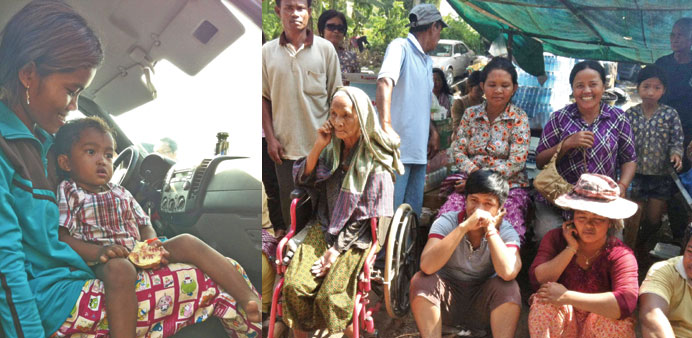Kong Keng, aged two years, is held by his mother Phat Soen as people gather to consult him in Cambodia’s Kompong Cham province yesterday. Right: People with various ailments await their turn to consult Kong Keng.
DPA/Khnor, Cambodia
About 1,000 people, many in wheelchairs, some carrying children with contorted bodies or mangled limbs, line up along the rutted dirt track leading to a wooden stilt home.
They are desperately hoping to be cured by Kong Keng, a two-year-old boy.
“We discovered my son was magical when his grandfather got sick and the boy healed him,” Phat Soeun said, without elaborating.
Since rumours spread last week that he could cure the sick, hundreds of desperate people have travelled each day to the village in Kompong Cham province, about a three-hour drive from the capital.
The boy’s family is charging visitors, mainly Cambodia’s rural poor, about $1 each to receive his blessing. The crowds are now so huge — after news of the boy spread in the national media — that he and his mother were hiding out at a relative’s house to escape the hordes.
The child is becoming “annoyed” by all the attention and is now “treating” only the worst cases, she said. But people keep flowing into the village and so does the money, which was being collected by family members in bowls.
Believers are also encouraged to give gifts, packages of cigarettes and cans of Red Bull. They also bring incense sticks, which the family says are given to local Buddhist monks.
There was a festival atmosphere, with vendors hawking duck eggs, mangoes and coconuts to the hungry faithful, many of whom have waited days to see the child.
One enterprising villager was selling cheap plastic children’s toys as a suitable gift for the blessed toddler, and was doing a roaring trade.
Those whom the boy does not see must be content to go away with a bundle of “magic” sticks and leaves blessed by the child, which they are advised to consume in tea. Kat They, 43, sitting in the shade of a tree near the boy’s house, said he had walked several hours from a neighbouring province to get the leaves for his 14-year-old son, who has polio.
“I heard on the radio that this boy has magical powers,” Kat They said, after waiting for more than a day. “I’ve taken him to Western doctors but they can’t treat my child. I’m paying 4,000 riel ($1) for the treatment.”
Nearby, 53-year-old mother Cheth Kimly wiped the sweat from her adult son’s forehead. He was lying on a rudimentary stretcher, a face mask covering his mouth and nose and thick blankets obscuring his paralysed legs.
“I heard the magic boy just puts something on the legs of those who are paralysed and then they get healed and can walk again,” Cheth Kimly said, clutching an incense stick in a pose of reverent prayer.
Stories of those who have been healed — blind people made to see, paralysed people who can walk — were circulating among the gathered, but the actual beneficiaries of the boy’s powers were hard to find.
Instead, the sick lay on mats on the hard dirt ground, their relatives fanning them to provide respite from the stifling heat.
Asked if they were not worried about being scammed by con artists, most looked surprised. Many explained that they had sought help from both Western and traditional doctors but with no success. “This is our last hope” was a common refrain.
Village chief Sou Hen said about 500 to 700 people were buying the bundles of leaves each day.
He also insisted on his belief in the child’s abilities.
“This is not fake,” he said, citing examples of people he says have been healed.
Cambodia’s healthcare system is widely derided as being chronically corrupt and inefficient. Underpaid and underqualified doctors regularly demand bribes from patients before agreeing to treat them.
The country’s elite flies to Singapore or Bangkok for medical treatment, shunning domestic clinics, while the poor often rely on traditional healers.
But the people travelling, some for many days, to see the boy would be unlikely to be helped even by the best modern doctors, because their ailments, such as polio or paralysis are incurable.
And the toddler who all the fuss is about? He was sitting on his mother’s lap, as water buffalo grazed nearby, a piece of fruit clasped in his small fist, seemingly unperturbed by all the fuss.

